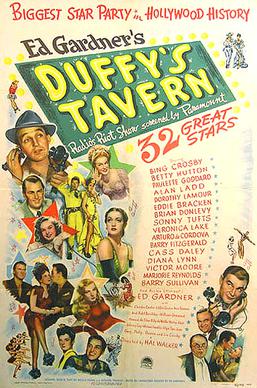Duffy's Tavern
[2] In the familiar opening, "When Irish Eyes Are Smiling," performed either solo on an old-sounding piano or by a larger orchestra, is interrupted by the ring of a telephone and Gardner's New Yorkese accent as he answers, "Hello, Duffy's Tavern, where the elite meet to eat.
Archie constantly bantered with Duffy's man-crazy daughter, Miss Duffy, played by several actresses, beginning with Gardner's real-life first wife, Shirley Booth, followed by Florence Halop and, later, by actress Hazel Shermet,[3] and especially with Clifton Finnegan (Charlie Cantor, later Sid Raymond), a likeable soul with several screws loose and a knack for falling for every other salesman's scam.
The series featured many high-profile guest stars, including Fred Allen, Mel Allen, Lucille Ball, Joan Bennett, Nigel Bruce, Billie Burke, Bing Crosby, Gracie Fields, Rex Harrison, Susan Hayward, Bob Hope, Lena Horne, Boris Karloff, Alan Ladd, Veronica Lake, Peter Lorre, Tony Martin, Marie McDonald, Vincent Price, Gene Tierney, Arthur Treacher, and Shelley Winters.
[6] An employee for Bristol-Myers—whose Ipana toothpaste was the show's early sponsor—persuaded the company's publicity director to demand the name change because the original title promoted "the hobby of drinking" too much for certain sensibilities.
Burrows and Matt Brooks collaborated on the screenplay for the 1945 film, Ed Gardner's Duffy's Tavern, in which Archie (with regulars Eddie and Finnegan) was surrounded by a throng of Paramount Pictures stars playing themselves, including Robert Benchley, William Bendix, Eddie Bracken, Bing Crosby, Cass Daley, Brian Donlevy, Paulette Goddard, Betty Hutton, Alan Ladd, Veronica Lake and Dorothy Lamour.
The film's plot involves a war-displaced record manufacturer whose staff—those not sent off to war—drown their sorrows at Duffy's on credit, while the company owner tries to find ways around the price controls and war attrition that threaten to put him out of business.
Broadcast on the BBC Light Programme from 4 July to 29 August 1956, Finkel's Café was written by Denis Norden and Frank Muir, and produced by Pat Dixon.

